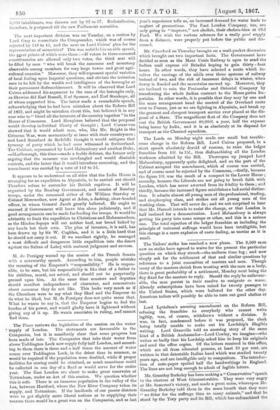The next important division was on Tuesday, on a motion
by Lord Grey to resuscitate the Compounder, which was of course rejected by 148 to 4:3, and the next on Lord Cairns' plan for the representation of minorities? This was unfoldel in an able speech, the ggeat points of which were these :—If voters in three-cornered constituencies are allowed only two votes, the third seat will be filled by men "who will break the sameness and monotony
observable among members for very large towns and great agri-
cultural counties." Moreover, they will represent special varieties of local feeling upon Imperial questions, and obviate the irritation sure to be felt by the wealth and intelligence of the boroughs at their permanent disfranchisement. It will be observed that Lord Cairns addressed his argument to the case of the boroughs only, as likewise did Earl Russell, E trl Spencer, and Earl Stanhope, all
of whom supported him. The latter made a remarkable speech,
acknowledging that he had been mistaken about the Reform Bill of 1832, and might be mistaken about this, but believed it in any case wise to " blend all the interests of the country together "in the House of Commons. Lord Houghton believed that the proposal would develop individual liberty of thought ; Lord Carnar von showed that it would admit men, who, like Mr. Bright in the Crimean War, were momentarily at issue with their countrymen ; and Lord Stratford de Redcliffe thought it would mitigate that tyranny of party which he had once witnessed in Switzerland. The Cabinet, represented by Lord Malmesbury and another Duke, —Marlborough, this time—made a feeble defence, the former only arguing that the measure was newfangled and would diminish contests, and the latter that it would introduce caucusing, and the amendment was carried by a vote of 142 to 51.






























 Previous page
Previous page